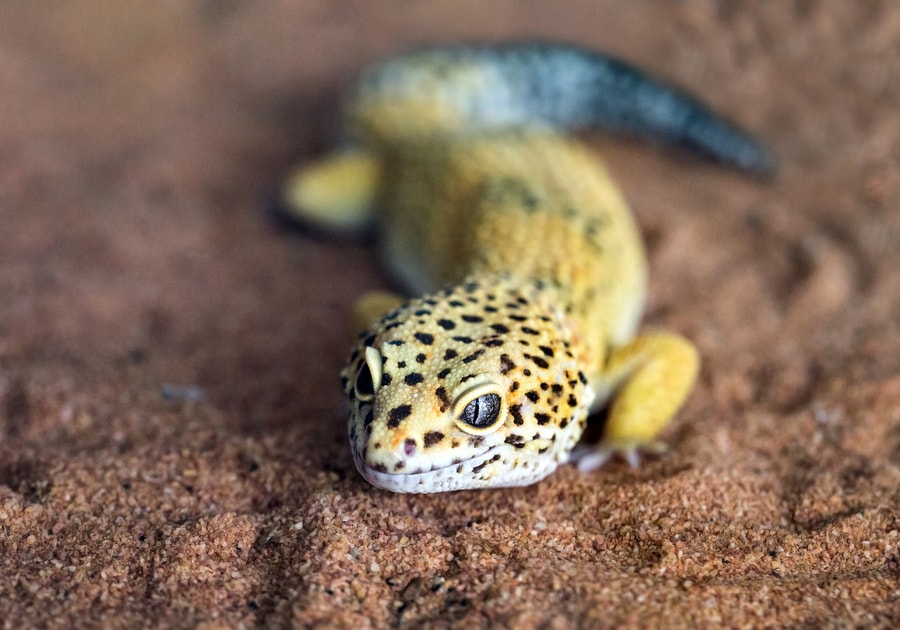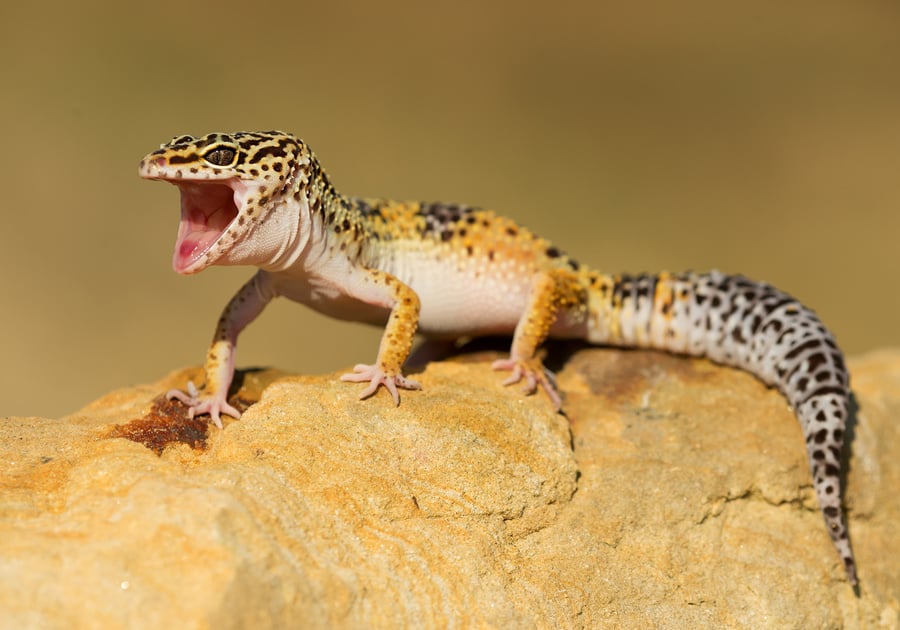
In the animal world, hearing can be an incredibly important sense. Particularly if you are trying to watch out for predators, hunting for prey, or simply trying to see if the environment is safe enough for raising young, hearing can be an important ability. In this sense, hearing is a form of survival.
Leopard geckos have highly developed hearing designed for survival to aid in predator detection and prey location at night which makes them very sensitive to loud noise like construction, music, or dogs barking.
Yet, some species of animals have better hearing than others. And, some even have more sound sensitivity than others. While it does depend on the animal, leopard geckos are, in fact, sensitive to loud sounds.
Are Leopard Geckos Sensitive to Noise?
So, are leopard geckos sensitive to sound and noise? Because hearing is a sense highly developed for survival especially at night where other senses are limited, leopard geckos will be very sensitive to loud or jolting noises.
In the wild, leopard geckos will use their sense of hearing to not only protect themselves from predators, but they need to hunt for their own prey.
Because leopard geckos hunt at night, it is difficult to rely solely on eyesight. Because of this, the leopard gecko’s hearing is sensitive and can pick up on the slightest of sounds. Leopard geckos do hunt insects, so they have to be able to listen for the smallest noise in the night if they’re going to hunt successfully for prey.
Even though leopard geckos do not need to worry about hunting as much while they are in their tank because they can always rely on a steady stream of crickets and other insects, that doesn’t mean that their hearing has become useless. In environments that have disturbingly loud noises, leopard geckos can become stressed and it can impact their behavior and quality of life.
Does Noise Affect Lizards Sense of Hearing or Feeling?
Because most lizards are sensitive to loud noises, having continuous loud music or noises can impact their hearing and stress levels. Similar to humans, loud noises can have an impact on hearing. However, researchers have found that most lizards have rather poor hearing for both lower and higher tones.
Because many lizards can hear a range from 100 to 4000 Hertz, they actually do have very similar auditory receptors as humans.
Is Loud Noise Bad for Leopard Geckos?
If you have loud noises near your leopard gecko’s tank or close to your home, it can be stressful for the leopard gecko. However, this will typically need to be a consistent loud noise that occurs all the time. So, you should not be concerned if you drop a loud pan on the floor or if you experience a particularly loud thunderstorm.
Additionally, the leopard gecko’s vivarium likely already does a great job of blocking excessive noise. Unless you have a completely open tank, you can likely expect that the vivarium is doing its job and muffling most noises.
However, too many loud noises and consistent loud noise can be stressful for your leopard gecko. As you may have seen in other articles, stress and leopard geckos are not necessarily the best mix. It can impact their behavior, can make them more irritable, and may be less likely to interact with you.
So, loud noises can be bad for leopard geckos, but it’s up to you to monitor your leopard gecko’s behavior to make sure that they seem stress-free. If you do happen to notice any behavioral changes due to stress and potentially loud noises, check out some of our tips below on how to reduce loud noises for your leopard gecko.
Noises & Leopard Geckos
When trying to evaluate which noises are bad for leopard geckos and which ones should be just fine, it’s always important to evaluate the intensity, duration, and the noise itself. If it helps, think about this from your own perspective:
- Does the music seem loud enough to be a distraction?
- How long has the music been playing?
- Is the noise more background or do you notice it immediately?
For example, if you consistently play incredibly loud music that is directly next to leopard gecko’s vivarium, and the music is never turned off, it may cause your leopard gecko stress. Yet, if you have a single night of loud music that is on the opposite end of your house from the leopard gecko’s tank, odds are your leopard gecko will be just fine.
Below are some common loud noises that many people experience in their homes or apartments, and they may be the ones that are associated with your leopard gecko’s stress. As always, it’s up to you to watch your leopard gecko and its behavior to decide if these loud noises are truly having a negative impact.
Music
If you are the type of person who likes to play music in your home, you don’t necessarily have to stop. But, you may need to turn the noise down if you are worried about its impact on your leopard gecko. Particularly if the music is in the same room as your leopard gecko or if you consistently play loud, jarring music, you may need to consider either turning the music down or moving your leopard gecko’s tank to another room.
Construction
Construction is one factor that you likely can’t control. That being said, loud construction noises that go on for a long period of time can absolutely cause the leopard gecko some stress. However, the level of stress will likely depend on how close the construction is to your home and how long the construction lasts. Luckily, most construction projects only last a few weeks or months, so you may just need to follow some of the tips to reduce stress caused by noise.
Fan & Air Conditioning
During the summertime, loud fans and loud air conditioning can induce stress. Especially if you are blowing a loud fan around in the room that your leopard gecko lives in or if your window AC unit is in the same room, the loud noise and extra blowing of air may be causing some stress.
If you are worried about your fan or air conditioning, see if you can either move your leopard gecko’s tank to another room or location or see if you can move the fan or air conditioning unit to a different room. If you are dealing with central air conditioning, you can likely close the vents in that room if you believe it is causing your leopard gecko stress.
Loud Talking
Consistent loud talking, screaming, or even babies crying may cause your leopard gecko some stress. But similar to our other types of sounds, consistency and duration are key. If you have a loud conversation with your best friend for just a few minutes, you should be fine. However, if you are constantly screaming and yelling around your home, you may cause your leopard gecko some stress.
We will talk about this more below, but soft talking can actually be great for your leopard gecko. So if you want to learn more about that, check out the section below.
Dogs Barking
Hearing dogs bark continuously and loudly can definitely cause your leopard gecko stress. Particularly because dog barking is the sound of another animal, your leopard gecko can show signs of stress. When determining if a dog’s barking has an impact on your leopard gecko’s stress levels, you should first figure out if it’s the dog that you have in your own household or if it’s someone else’s.
If you suspect that your own dog’s barking is causing your leopard gecko stress, you may want to work with your dog on bark inhibition. But if the dog across the street is barking all the time, there probably is a good chance that your leopard geckos vivarium is muffling the noise enough to not disturb your leopard gecko. But, you may still want to try playing some soft music in the room or closing doors and windows in your leopard gecko’s room to muffle the noise.
Are Any Noises Good for Leopard Geckos?
While some sounds such as loud construction and dogs barking may cause some stress, not all sounds are bad sounds. Because of this, you can use the good sounds to your advantage. You can play enjoyable sounds if you’re planning on changing your leopard gecko’s environment or if you want to improve your bonding and socialization strategy.

Your Voice
The sound of your voice can be something that becomes a useful tool for your leopard gecko. In fact, getting your leopard gecko used to the sound of your voice can actually help build a better and closer bond. Especially if you talk to your leopard gecko or at least the talk while you were in the room and feeding your leopard gecko, your leopard gecko will begin to associate the sound of your voice with positive things, such as food.
Establishing a trusting bond with your leopard gecko is incredibly important to your relationship. While daily handling and socialization is the key to developing this trusting bond, using the sound of your voice to help soothe your leopard gecko by talking quietly in soft tones can also help develop this sense of trust and help calm your leopard gecko.
In addition, some leopard gecko handlers have even found that their leopard gecko will pop their head out at the sound of their voice just to say “hi”. So if you want to get your leopard gecko used to you, use your voice!
Nature Sounds & Soft Music
Playing soft nature sounds can be a great way to help calm you are leopard gecko. Especially if you do live in an area that is prone to loud noises, having these soft nature sounds can be something that will help soothe a leopard gecko.
In addition, if you play the same nature sounds or soft music in the room that you’ve moved your leopard gecko to, it may even help them adjust to their new environment easily. Because they are already used to the sound of the music, they might be able to associate that sound to their normal environment and be able to adapt more quickly.
The key to this tip is to make sure that the music or nature sounds are not too loud. In fact, they should be played very softly and probably across the room from your leopard gecko’s tank.
Even further, these nature sounds may even help your leopard gecko relax and fall asleep better. Plus, the nature sounds and soft music may even help you fall asleep if you have trouble falling asleep at night. This sure seems like a win-win for everyone.
How to Reduce Stress Caused by Noises
Luckily, there are some easy ways that you can reduce stress caused by loud noises. While you cannot control every single noise, you can at least control the ones that are likely causing the disturbance.
Move Your Leo’s Tank
If you have loud noises in your home or in your room, the easiest way to help control stress caused by noise is to move your leopard gecko’s tank to another room. Of course, not everyone will have this luxury. If you don’t have much space, you should at least try to get your leopard gecko’s tank as far away from the noise as you can.
Close the Door
If you combine moving your leopard geckos tank with closing the door to the room that your leopard gecko lives in, you can likely reduce most of the noise. Closing the door is an easy remedy to helping with the excess noise, and may be one of the first things that you should try if you are trying to reduce your leopard gecko stress.
Close the Window
If you tend to leave your windows open and know that you have noises coming from outside, it may be worth it to close your windows. For the most part, this should improve the level of noise that you let into your house and should hopefully be enough to help reduce the stress that your leopard gecko may be feeling.
Play White Noise, Nature Sounds, or Soft Music
If you still cannot get the noise under control, it may be worth it to play white noise, nature sounds, or soft music in the room that your leopard gecko lives in. Because the softer music can cover up some of the more disturbing sounds, it may be at least worth the try.
Put a Blanket Over the Tank
You can also try to place a blanket over your leopard geckos tank. However, if you do choose to try this method, there are some other factors you need to keep in mind. If you put a blanket over the top of your tank, it may increase the heat in your leopard gecko’s enclosure and may put your leopard gecko at risk for overheating.
So while this trick could potentially help with the noise, make sure you have a proper thermostat and heating and cooling system in your leopard gecko’s tank before you try it.
Talk to Your Family, Friends, or Neighbor
While it may not be a comfortable conversation, if you suspect that your friends, family members, or neighbors are making too much noise, it may be worth it to have a conversation about the noise level.
You can simply explain that the loud noises are too distracting, and you should work together to find a solution or compromise. Additionally, if you are having problems with the noise, odds are other people who live around you are also experiencing the same thing.
